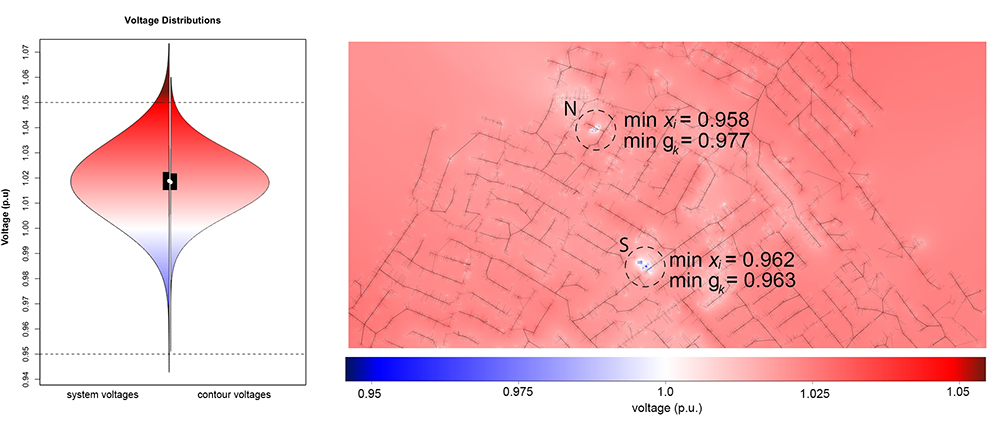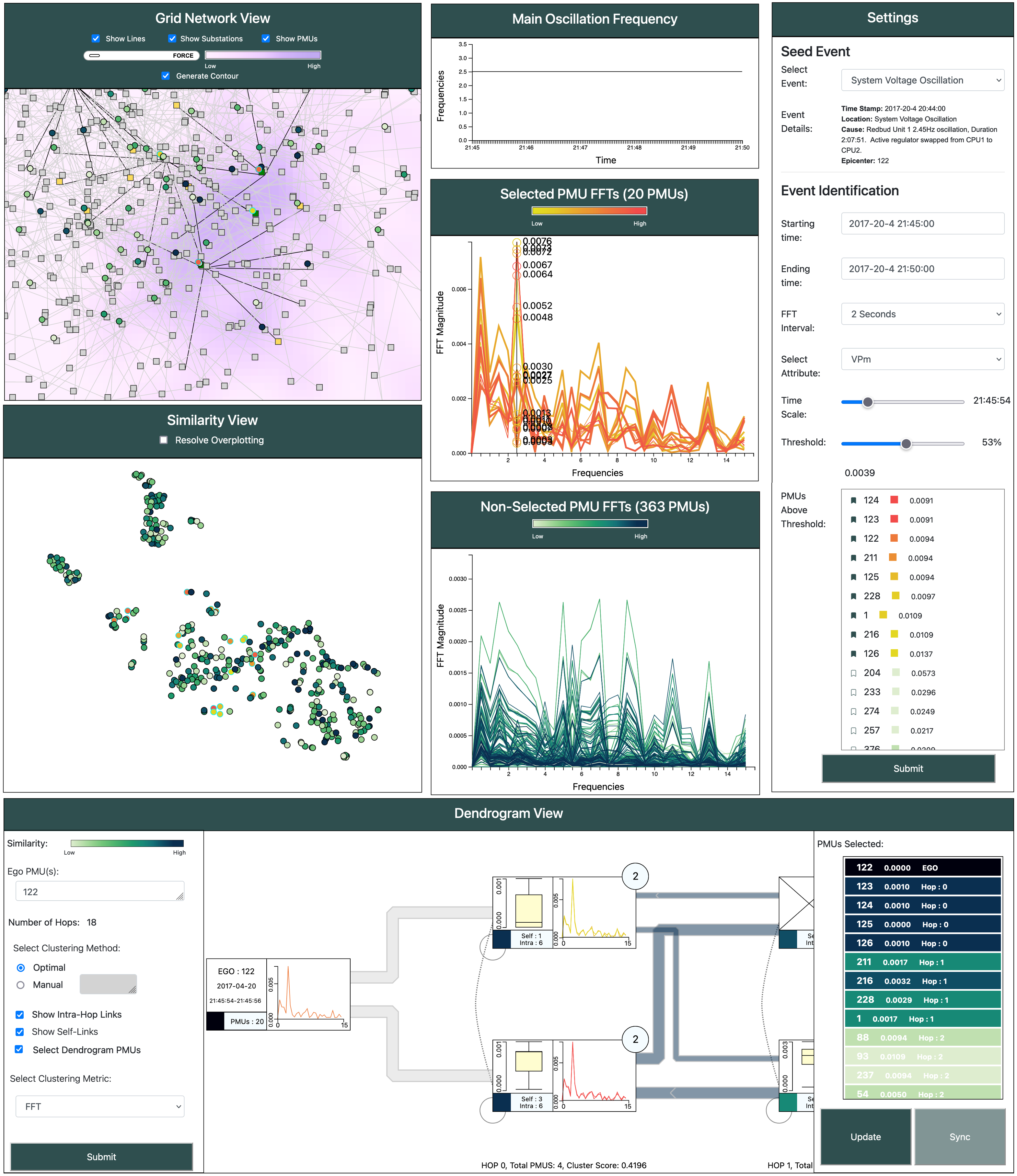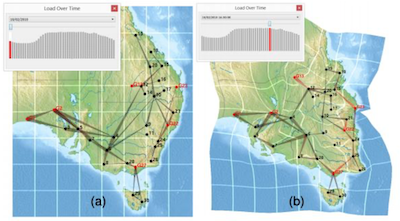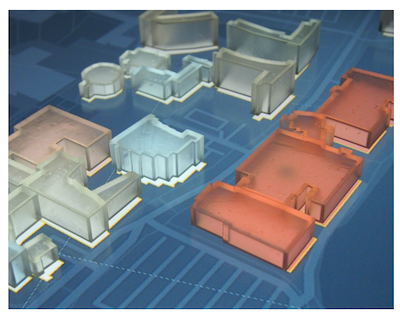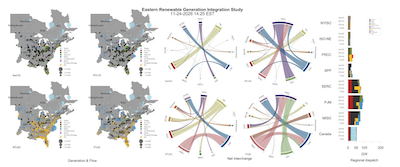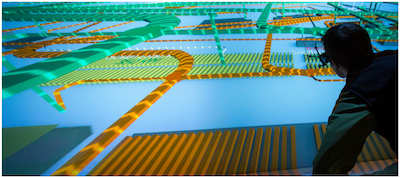EnergyVis 2024
In conjunction with IEEE VIS 2024, St. Pete Beach, Florida, USA. For registration information see the IEEE VIS website.
The energy sector is witnessing significant technological progress, primarily driven by the growth of renewable energy, distributed energy resources, and smart grid technologies. This rapid evolution is generating increasingly large, complex data that present substantial challenges for energy systems planning and operations. For example, previously, distribution feeders had only a handful of sensors and controllable devices; now, with these new technologies, thousands or even tens of thousands of such devices are possible. As a result, energy system models have grown exponentially in planning scenarios from just hundreds of components to millions. Moreover, the adoption of distributed solar generation and grid-aware devices such as smart thermostats and electric vehicles are expanding the breadth of stakeholders, including consumers, engineers, regulators, urban planners, and policymakers, who are trying to understand these energy systems. These new energy systems are generating vast amounts of complex data, which require visualization techniques capable of handling the sheer scale and multifaceted complexity of the information. Unfortunately, much of the visualization supporting these changes is outdated, with simple one-line diagrams and contour plots being over-extended by the data they are being applied to. More research is needed to develop new and innovative visualization methods that can handle the increasing complexity of energy systems and provide a diversity of stakeholders with the necessary insights to make informed decisions about the future of energy. This year’s workshop will be themed around decision support.
The EnergyVis 2024 workshop aims to bring together scientists, researchers, and practitioners from the energy and visualization domains to critically assess and discuss energy data visualization in the context of the evolving energy sector. The workshop's main objectives will be to seed the development of a publishable report on the state-of-the-art and grand challenges in energy data visualization, and to develop stronger international collaborations for this important area of multidisciplinary research. To that end, the workshop will discuss:
- ■ the current state of the art in energy data visualization,
- ■ the challenges, opportunities, and goals in energy data visualization,
- ■ the impact of information bias associated with stakeholder roles on the usage of energy data visualization,
- ■ the role visualization has in enhancing understanding and facilitating informed decision-making processes,
- ■ case studies, experiences, lessons learned, and best practices in energy data visualization.
Update: Due to the impacts of hurricanes Helene and Milton, IEEEVIS and EnergyVis 2024 will be 100% virtual.
EnergyVis 2024 will be a half-day virtual "in-person first" workshop (hybrid for attendees with in-person presentations) on afternoon of October 14th 2024 at the Tradewinds Island Grant Beach Resort in St. Pete Beach, FL, USA.
EnergyVis will consist of brief paper talks, short invited industry talks and a collaborative interactive brainstorming and discussion with all participants on the common challenges and goals in
this domain. The short talks will provide initial prompts for these group discussions.
Are you interested in ENERGY DATA and helping us to dig deeper into understanding the CHALLENGES and OPPORTUNITIES there is in the field of energy data visualization? Please join us to have this discussion! Note that all participants, including presenters, must register to attend the workshop at the IEEE VIS website: 1 Day, 2 Day, or Full Week tickets are available. We look forward to seeing you there!
Please contact one of the workshop chairs below if you have any further questions.
- 16:00 GMT: Introduction
- 16:10 - 17:15 GMT: Paper Presentations and Q&A
- Pathways Explorer: Interactive Visualization of Climate Transition Scenarios. By: François Lévesque, Louis Beaumier, Thomas Hurtut
- Architecture for Web-Based Visualization of Large-Scale Energy Domains. By: Graham Johnson, Sam Molnar, Nicholas Brunhart-Lupo, Kenny Gruchalla
- ChatGrid: Power Grid Visualization Empowered by a Large Language Model. By: Sichen Jin, Shrirang Abhyankar
- Extreme Weather and the Power Grid: A Case Study of Winter Storm Uri. By: Baldwin Nsonga, Andy Berres, Robert Jeffers, Caitlyn Clark, Hans Hagen, Gerik Scheuermann
- Opportunities and Challenges in the Visualization of Energy Scenarios for Decision-Making. By: Sam Molnar, Kenny Gruchalla, Graham Johnson, Kristi Potter
- Challenges in Data Integration, Monitoring, and Exploration of Methane Emissions: The Role of Data Analysis and Visualization. By: Parisa Khiabani, Gopichandh Danala, Wolfgang Jentner, David Ebert
- 17:15 - 17:45 GMT: Break and Networking
- 17:45 - 18:40 GMT: Paper Presentations and Q&A
- CPIE: A Spatiotemporal Visual Analytic Tool to Explore the Impact of Coal Pollution. By: Sichen Jin, Lucas Henneman, Jessica Roberts
- Operator-Centered Design of a Nodal Loadability Network Visualization. By: David Marino, Maxwell Keleher, Krzysztof Chmielowiec, Antony Hilliard, Pawel Dawidowski
- Situated Visualization of Photovoltaic Module Performance for Workforce Development. By: Nicholas Brunhart-Lupo, Kenny Gruchalla, Laurie Williams, Steve Ellis
- Developing a Dashboard To Enhance Visualization of Similar Historical Weather Patterns and Renewable Energy Generation. By: Sanjana Kunkolienkar, Nikola Slavchev, Farnaz Safdarian, Thomas Overbye
- Evaluating the Impact of Power Outages on Occupancy Patterns During the 2021 Texas Power Crisis. By: Andy Berres, Baldwin Nsonga, Caitlyn Clark, Robert Jeffers, Hans Hagen, Gerik Scheuermann
- 18:40 - 19:00 GMT: Discussion and Next Steps for EnergyVis
We are interested in bringing together multidisciplinary perspectives, especially on the human-centric component of energy visualizations. We invite innovative ideas, design concepts, requirement analysis and work-in-progress relating to the following technical scope:
- ■ Data visualization techniques for emerging energy systems and smart grids.
- ■ Visualization and visual analytics for energy demand forecasting, load balancing, energy trading, and market operations.
- ■ Design and evaluation of energy visualizations for decision support.
- ■ Interaction techniques for exploring and navigating large and complex energy data.
- ■ Case studies and best practices in energy data visualization.
- ■ Position statements, including but not limited to:
- ■ Challenges in designing effective visualizations for energy data.
- ■ Impact of stakeholder roles in visualization consumption patterns for energy data.
- ■ Future research directions in energy data visualization.
We are accepting short papers, up to four pages plus up to 1-2 page of references (i.e. max of 6). Submissions will be in the VGTC conference two-column format, in line with the IEEE VIS formatting guidelines. Accepted papers also have the option of publishing their work at IEEE Xplore.
Papers should be submitted through PCS via VGTC > VIS 2024 > EnergyVis . After logging into PCS, go to ‘Submissions’, and select Society ‘VGTC’, Conference ‘VIS 2024’, and Track ‘VIS 2024 EnergyVis’.

- Submission Deadline:
June 28,July 5, 2024, AoE - Author Notification:
July 26,August 1, 2024 - Conditional Accepted submissions: August 14, 2024, AoE
- Camera-ready submission: August
9,16, 2024, AoE - Workshop: October 14, 2024, 16:00 GMT
- Kenny Gruchalla National Renewable Energy Laboratory (NREL), USA
- Anjana Arunkumar Arizona State University
- Sarah Goodwin Monash University, Australia
- Arnaud Prouzeau Université Paris-Saclay, Inria, CNRS, France
- Lyn Bartram Simon Fraser University, Canada
- Wes Bethel San Francisco State University
- Yousu Chen Pacific Northwest National Laboratory (PNNL)
- Livia Sampaio Campos Universidade Federal de Campina Grande
- Paul Cuffe University College of Dublin
- Johanna Fulda Clir Renewables Inc, Vancouver, BC, Canada
- Alex Godwin American University, Washington D.C.
- Maria Jesus Lobo LASTIG, Université Gustave Eiffel
- Patrick Mackey Pacific Northwest National Laboratory (PNNL)
- Sebastian Meier Potsdam University of Applied Sciences
- Samantha Molnar National Renewable Energy Laboratory (NREL)
- Luiz "Gusto" Morais Universidade Federal de Pernambuco
- Thomas Overbye Texas A&M University
- Cagatay Turkay University of Warwick
